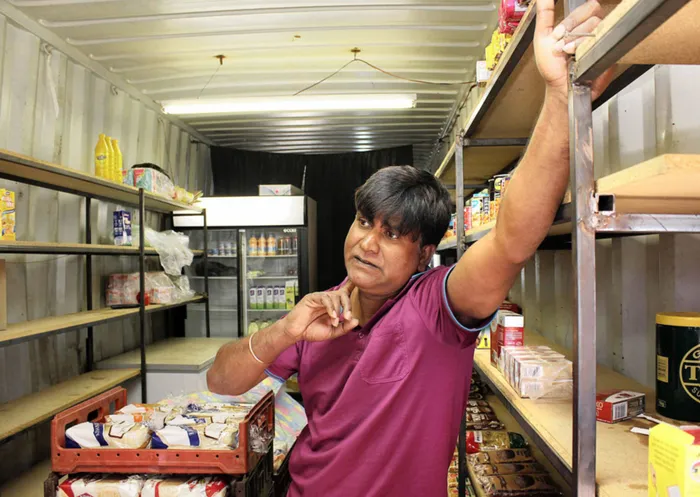Get involved, alien shopkeepers urged

567 11.06.2013 Monsur Rahman owner of the shop that was looted by the resident of Orange farm, he newly opened after the xenophobic attacks to the Pakistan shop owner that took place in the area. Picture: Motshwari Mofokeng 567 11.06.2013 Monsur Rahman owner of the shop that was looted by the resident of Orange farm, he newly opened after the xenophobic attacks to the Pakistan shop owner that took place in the area. Picture: Motshwari Mofokeng
Johannesburg - Orange Farm is back in order. Or at least it’s trying to be. A Bangladeshi shopowner’s jars of jam have been placed neatly in a row.
The pupils who cheered the looters mill about the same container across the street from their school, buying bubblegum.
The foreign-owned tuckshops have been back in business for three days - just two weeks after they were swept clean by looters in a series of attacks in the area and in Sebokeng and Evaton, further south.
At a meeting on Tuesday at the Orange Farm Multipurpose Community Centre, around 100 residents and 30 foreign shopowners discussed how to clean up the tension that went along with spilt mealie meal.
The language of unity was strong, with speeches from the joint operations committee and an assembled group of leaders, including representatives from the SAPS, the ANC Orange Farm branch, the church, the African Diaspora Forum, the Consortium for Refugees and Migrants in South Africa and the Orange Farm Business Council.
But language happens to be just one of the problems. As the meeting opened with a prayer and the anthem, the foreign shop-owners stood respectfully but did not know the words.
People advocated one Africa, integration and forgiveness, and earlier on Tuesday, shopowners said the community had called them back and it was that support that drew them to try again. The intentions are there.
For Bangladeshi shopowner Monsur Rahman, who lost goods worth more than R30 000 when his two containers were looted, it’s a new start. He purchased new shelves and new refrigerators. His shelves are barely stocked. It would take almost a month to fill them again, he said.
“Right now it’s good,” he said. “But if it happens again, I’m going back to my country. My wife is crying, she wants me home already. They say they don’t care about the money, they want me safe.”
Rahman said he moved to Orange Farm five years ago, seeking business opportunities and an escape from the troubles of his own country.
He smiles at returning customers, calls a few by name and says he can say a few Sotho and Zulu words. But that’s not enough to be integrated, said residents at the meeting.
A South African business owner in the audience said the foreign shopowners must not over-saturate the market, opening shops too close to locally owned shops. Another resident complained that often the stock is expired, and that foreign shopowners might propose to young women inappropriately.
Another resident said foreign shopowners must not shower in the wells, with the same water she uses to brush her teeth.
Still, the foreign shops are a part of the community.
Alfani Yoyo of the Consortium for Refugees and Migrants in South Africa called on foreign shopowners to make an effort to integrate. “You need to come out of your containers, you need to mingle with the people, not just smile from the other side of the window,” he said.
On the other hand, residents could not resort to looting to “level the field” or take advantage of service delivery protests to take out anger on other residents.
These acts were criminal, not xenophobic, SAPS spokesman Constable Shaan Motsapi said.
“It is our mandate to make sure all of you and your belongings are safe. The community is not xenophobic, it’s just a few people who took the opportunity to attack. But indeed it is criminal to discriminate, criminal to attack just because someone is not your colour,” he said.
More than 300 people were arrested over the attacks in the south of Joburg two weeks ago.
karen.chen@inl.co.za
The Star